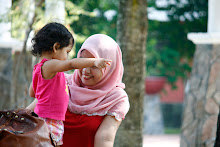Physical Development
During her second year, my toddler is continuing to investigate the way things feel, smell, look, sound, and taste. While she may still put inedible things into her mouth as a form of exploration, much as she did when she was a baby, she will rely on her other senses to help her discover the world. She will feel the soft fur on a cat's back, enjoy the smell of fresh muffins baking, observe her reflection in the mirror, listen to the birds or planes overhead, and--hopefully--sample the flavors and textures of new things to eat. My toddler may even become overwhelmed or overstimulated by too much sensory input (at a birthday party, for instance, or after a long outing), and because she lacks the awareness and words to tell you me, she act fussy or distracted, or "melt down" into tantrums or tears. For her, the world is a sensory banquet, but one that must be savored in small, child-size bites!
Social Development
Dracula alert! Though toddlers tend to put fewer things into their mouths as they get older, some may, on occasion, bite another child as an act of aggression, excitement, or discovery. Most often, children bite because they are frustrated or angered by an incident--such as another child's unwillingness to share a toy--and don't have the words to assert themselves or the ability to control the situation. Biting, like hitting, pinching, or hair pulling, is a primal form of expression, and as such, it is not an uncommon behavior in small children, who have yet to develop social skills or understand that their actions have a physical and emotional impact on others. (Remember, kids this age are still naturally egocentric and lack a sense of empathy.) So will a little biter turn into a mean-spirited adult? Probably not. With the proper guidance, a bigger vocabulary, and better sense of self-control, a teeth-baring toddler generally outgrows the biting habit by age 3.
Intellectual Development
Unlike adults, t oddlers have no concept of time. And as i've probably discovered, words like "please hurry" or "in a second" don't have the same meaning to an in-the-moment as they do to a parent or even an older child. My toddler is focused on the present, comprehending the notion that things happen here and now (she wants lunch now, she wants to leave the store now, she wants to go to the playground now). But as she approaches her second birthday, she'll slowly begin to understand the concepts of "soon" and "later," particularly i shall need to provide her with concrete examples. ("We'll have lunch soon, right after we bring in the groceries," or "Opah will be here later, right after we finish our lunch.")
oddlers have no concept of time. And as i've probably discovered, words like "please hurry" or "in a second" don't have the same meaning to an in-the-moment as they do to a parent or even an older child. My toddler is focused on the present, comprehending the notion that things happen here and now (she wants lunch now, she wants to leave the store now, she wants to go to the playground now). But as she approaches her second birthday, she'll slowly begin to understand the concepts of "soon" and "later," particularly i shall need to provide her with concrete examples. ("We'll have lunch soon, right after we bring in the groceries," or "Opah will be here later, right after we finish our lunch.")
I bet, by age 3, my child will start to comprehend that things happen in the past, present, and future, although many preschoolers will use a general term such as "yesterday" for any event that occurred in the past or "tomorrow" for anything that is to take place in the future. By about age 6, children should begin to have a clearer picture of time. At that point i can urge my child to "Hurry, or you'll be late!" and she'll have some idea of what i'm saying.
Sources:Sources: Zero to Three (www.zerotothree.org); Spock, Benjamin, MD, and Parker, Steven J., MD, Dr. Spock's Baby and Child Care (Pocket Books, 1998)


.jpg)






0 comments:
Post a Comment